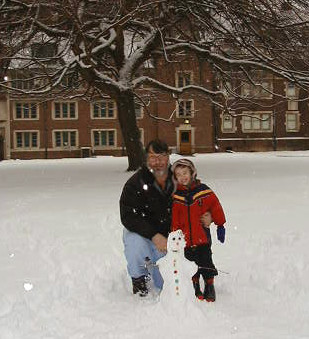December 07, 2003
88 English words from snow
We've just had our first nice snow in the northeast U.S., and so we linguists are bracing ourselves for the inevitable avalanche of observations about the many Eskimo words for frozen precipitation. Geoff Pullum is especially likely to get a few journalistic inquiries. In order to point this old conversation in new directions, let me suggest that everyone is missing a chance here. True, the role of the concept X in a given culture can to some extent be seen in its stock of words for X in various contexts and subtypes, its words for X. But at least as many clues can be found in a culture's use of metaphor and metonymy based on X to name other things, its words from X.
This is part of what John McWhorter was doing in his seminal remarks on the many English words from stand, and what Bill Poser did in his response on Carrier beaver vocabulary, further echoed by my post on the MIT beaver-related lexicon, and (in a different vein) David Beaver's skit on beaver names and beaver identities. When a language resists borrowing vocabulary for borrowed concepts, as Sally Thomason writes about Montana Salish, metaphor and metonymy get worked especially hard; cars wind up being things with wrinkled feet, rather than just being called by the Montana Salish pronunciation of "car". Far from having any problems with new vocabulary, English has famously "on occasion ... pursued other languages down alleyways to beat them unconscious and [rifle] their pockets for new vocabulary". However, English still derives plenty of words by metaphor and metonymy, because no matter how many words you have, no matter how many more you can borrow from your neighbors, it seems that there are always new things to make words for.
As meteorologically relevant evidence, I offer an initial list of 88 English words from snow. I've limited myself to compound words or lexicalized phrases containing the morpheme snow, gleaned from the OED, Webster's 3rd and a few minutes of idle thought. All the words for actual (kinds of) snow have been removed, and I'm ignoring the extensive polysemy of snow and many of its derivatives.
Snow White, glory-of-the-snow, snow angel, snow apple, snow azalea, snow bear, snow berry, snow blindness, snow board, snow boots, snow bunny, snow bunting, snow burn, snow cam, snow castle, snow cat, snow cone, snow crab, snow crash, snow day, snow drop, snow fence, snow finch, snow flea, snow fly, snow fort, snow goggles, snow goose, snow grass, snow grouse, snow guard, snow gum, snow hare, snow job, snow knife, snow lemming, snow leopard, snow lichen, snow light, snow lily, snow machine, snow man, snow mobile, snow mold, snow mosquito, snow pants, snow partridge, snow pea, snow pear, snow pheasant, snow pigeon, snow plow, snow pudding, snow pusher, snow quail, snow report, snow roller, snow rose, snow scald, snow sculpture, snow shoe, snow sleigh, snow snake, snow static, snow suit, snow sweeper, snow thrower, snow tire, snow train, snow trillium, snow vine, snow vole, snow wreath, snow-in-summer, snowball fight, shoeshow hare, snowshoe siamese, snowy campion, snowy egret, snowy lemming, snowy orchid, snowy owl, snowy plover, snowy tree cricket, the Snow Queen, to be snowed in, to snow under.
Many of these words carry big loads of cultural baggage: snow angel, snow man, Snow Crash, Snow White, snow job, and so on.
The variable internal punctuation may fool you into feeling uncertain that these compounds and phrases are really "words": snow suit, snow-suit, snowsuit. But just consider the variable yet specific semantic contributions of the morpheme snow to the meaning of the compound words snow angel, snow man, snow shoe, snow cone, and snow job: "a winged figure imprinted in the snow by lying on the back and waving the arms up and down"; "a humanoid figure made by piling up large snowballs and decorating them"; "flat frames strung with cords and worn on the feet so as to be able to walk in deep snow"; "a confection of shaved ice and syrup, reminiscent of flavored snow"; "an elaborate deception, an overwhelming blizzard or snow drift of insincerity". You couldn't automatically calculate this stuff just from the core meanings of the morphemes snow, angel, man, shoe, cone and job. You have to live in a culture where people use these words to talk (or write) about these things, a culture with shared snow-experiences that are diverse and salient enough to create and maintain so many words from snow.
I suspect that there are at least as many English words from ice -- but not now...
Now, it's time to go make a snowman! 
As Grete Tartler wrote (translated from the Romanian by Fleur Adcock)
How sensually we shall relish, under our camouflage of snow,
the simplification of vocabulary!
Posted by Mark Liberman at December 7, 2003 07:11 AM